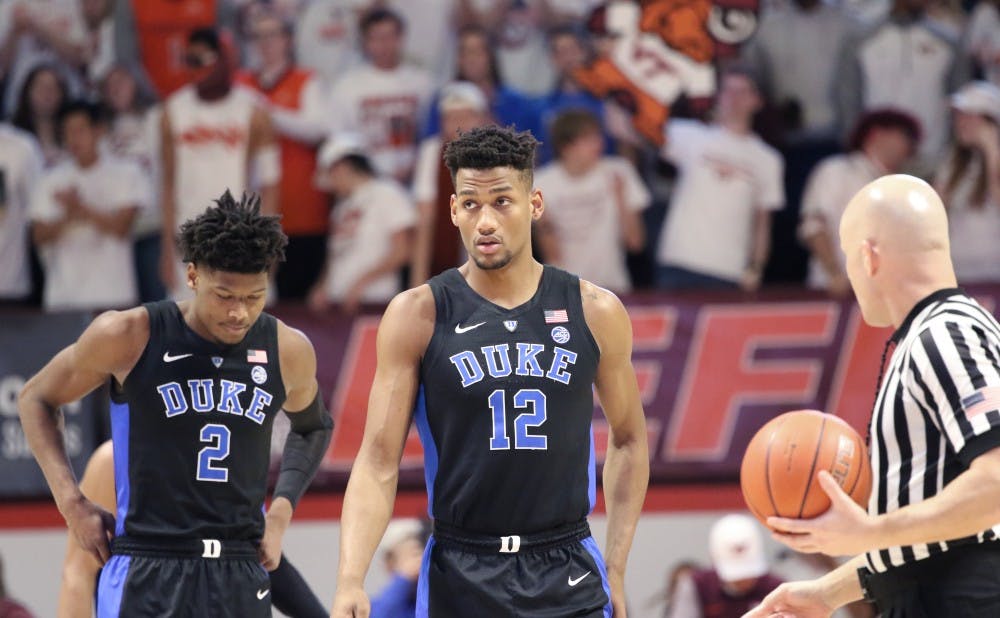With the game tied at 59 after fighting and clawing their way through the match, the Blue Devils looked ready to finally take the lead for good and put the Hokies away.
Duke’s unusual 2-3 zone defense, however, left Hokie guard Wabissa Bede open for a 3-pointer, which he knocked down with ease. That make especially highlighted a lack of identity for the Blue Devils, which ultimately lost them the game.
Ranked fifth in the nation in 3-point field goal defense—holding its opponents to just 28.7 percent from beyond the arc—Duke did not close out well down the stretch, allowing Virginia Tech to hit two of the most important shots of the game—the one previously described by Bede and another open trey with a minute and half left to play to seal the deal for the Hokies. These shots left Duke stunned and unable to recover, dropping its second of three games without its star freshman Zion Williamson.
“We weren’t rotating fast enough. We were where we needed to be, but we just weren’t fast enough,” freshman Cam Reddish said. “They made tough shots and it was just a hard fought game.”
Ever since the Spartanburg, S.C., native went down due to injury against North Carolina last Wednesday, the Blue Devils have not looked the same. Obviously, the team lost a bulk of its offensive prowess without the second leading scorer in the ACC, but in Duke’s loss to Virginia Tech, it is clear that the team has lost much more.
Williamson’s mere presence on the floor allowed his teammates to play more loose and unbothered, and with Williamson on the bench, freshman R.J. Barrett suffered the most against the Hokies. According to head coach Mike Krzyzewski, Barrett felt sick during the first half, and the fact that Virginia Tech was able to focus its defense solely on him made matters worse. The leading scorer in the ACC scored just four points in the first half, shooting 1-of-7 from the field. Barrett’s lack of aggression early on allowed Virginia Tech to control the pace of the game, and keep a small lead going into the locker room.
“Once we started the game, it was obvious that we weren’t getting our normal movements offensively and defensively because they’re accustomed to Zion,” Krzyzewski said. “We had to make some adjustments there.”
Duke’s offense was also hindered by its inability to force turnovers, which usually help the Blue Devils get out in transition and speed the game up. Throughout the season, Duke’s opponents have averaged 13.9 turnovers per game—Virginia Tech only coughed up a single live ball once in 40 minutes of play and had just six turnovers in the contest.
This led to just five fast break points for the Blue Devils, and Duke’s half-court offense was not efficient enough without Williamson as a saving grace down low. Barrett and Reddish did a good job of picking up the slack, getting a number of tough shots to go in crunch time, but their heroic acts were not enough to ever take control.
All is not lost for the Blue Devils, as Duke fought hard in the second half to compete and force Virginia Tech to play almost perfectly to edge out a win. Barrett and junior Marques Bolden connected multiple times down the stretch for important scores down low, proving that the Blue Devils' post game can still be utilized without Williamson.
“Virginia Tech won a tough game, and we fought them and they fought back and they were just a little bit more successful than we were,” Krzyzewski said. “Congratulations to them and they deserved it.”
When Williamson is on the floor, he brings an electrifying presence with his monster dunks and highlight plays galore, However, Duke looks like a completely different team on both ends of the ball without him, and the results have been less than desirable to say the least. While Williamson heals, the Blue Devils must find a way to dominate, as they have the talent and hopefully the heart to do so even without its best player.
Get The Chronicle straight to your inbox
Sign up for our weekly newsletter. Cancel at any time.

